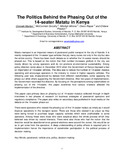| dc.description.abstract | Matatu transport is an important means of paratransit public transport in the city of Nairobi. It is
mainly composed of the 14-seater type vehicles that ply many routes not only in the city but also
the entire country. There has been much debate as to whether the 14-seater matatu should be
phased out. This is based on the notion that their number increases gridlock in the city, are
mostly driven by unruly operators and do not promote environmental sustainability. Strong
policy direction came about in December 2010 when the Government of Kenya imposed a ban
on importation of 14-seater vehicles. The idea was to reduce the number of 14-seater matatus
operating and encourage operators in the industry to invest in higher capacity vehicles. The
following year was characterized by debate from different stakeholders, some opposing the
phase out while others supporting the Government directive. After two years of implementation,
the Government rescinded the directive. By focusing on the perceptions among stakeholders on
phasing out of the 14-seater, this paper examines how various interests affected the
implementation of the directive.
This paper uses primary data on phasing out of 14-seater matatus collected through in-depth
interviews in two phases of research on business strategies of paratransit operators and
regulatory compliance. The paper also relies on secondary data published in local media on the
debate on the 14-seater phase out.
There were operators who viewed the phasing out of the 14-seater matatu as timely as it would
improve operations in the transport sector. There are those who viewed it as unjust as they
were being forced to purchase larger capacity vehicles which were unaffordable to some
operators. Among these were those who were sceptical about the whole process which they
believed was driven by vested interests. There were also those who had the notion that the
directive would be abandoned once general elections were around the corner, this would be so
as to get votes from the operators. A deep understanding of policy effects is required prior to
implementation hence the importance of stakeholder participation in the political process of
decision making. | en_US |

